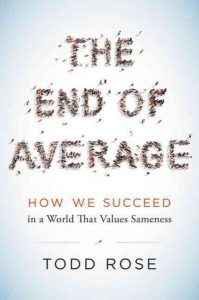 This book came highly recommended to me because of the way it applies the concepts of Individualism to the self, the workplace, corporations and education. It is not another book about education and personalized learning. Rather it is a book about the fundamental question:
This book came highly recommended to me because of the way it applies the concepts of Individualism to the self, the workplace, corporations and education. It is not another book about education and personalized learning. Rather it is a book about the fundamental question:
“Do we want a system of higher education that compels each student to be like everyone else, only better? Or do we want a system that empowers each student to make their own choices?” (Rose, 179)
Rose writes that today, “we have the ability to understand individuals and their talents on a level that was not possible before.” (Rose, 13) And he challenges us, regardless of our field, career or position, to use the tools and know-how to build better relationships, companies and education systems. You would be interested in reading this book because:
- It has direct implications to education
- There are compelling examples of companies and schools that are applying Individualism with success
- There is a call to action for all who care about education and its future potential
The book begins with a treatise on Averagarianism. Started by Quetelet’s ideas in the 19th century that the average is normal, the individual was now the error. (Rose 31) This would lead to (what we now understand) gross assumptions about body size for American pilot cockpits, for understanding the functional areas of the brains, and it would “prompt generations of parents to worry if their child did not develop according to the average milestones.” (Rose, 31). It was this famous statistician of the 19th century that still shapes and influences our education system:
The idea that what matter most about an individual was how much better or worse they were than the average. To our twenty-first century minds, it has come to seem so natural and obvious that talented people are ‘above average’ while incompetent folks are ‘below average’…[Thanks to Quetelet and his deciple Galton] human worth could [now] be measured by how close a person was to the average with the notion that worth was better measured by how far a person was from the average. (Rose 35)
Thus, our education system, indeed almost all of our organizations have an organizational chart, and the higher up you are, the more ‘power’ you have. The higher up you are, the seemingly more talented you are. Life, then, becomes a struggle to get up that ladder, because it is an outward show of who you are and what you are made of.
Rose counters this “Age of Average” with excellent examples and solid science to show just how far we have come in understanding human beings. Individualism, writes Rose, has three main tenants:
- The Jaggedness Principle: we cannot apply one-dimensional thinking to understand something that is as complex and varied as a person
- The Context Principle: individual behaviour cannot be explained or predicted apart from a particular situation, and the influence of a situation cannot be specified without reference to the individual experiencing it
- The Pathway Principle: in all aspects of our lives and for any given goal there are many, equally valid ways to reach the same outcome. The particular pathway that is optimal for you depends on your own individuality (Rose)
Using these three principles, the book goes into excellent examples of companies and schools that have adopted this approach. Google, Microsoft, Zoho, and more. They have changed hiring practices (Check out ‘How we Hire’ at Google), their assessment of employees (Check out ‘Micorsoft and Dell are Ditching Performance Reviews‘), and how they commit to their employees (Check out Costco’s commitment to their employees).
Rose also address how to apply these principles to education. While he focusses on higher-education, his concepts have implications to secondary education as well. Currently, we correlate speed with learning ability – those timed tests and assignments with deadlines, and those educators who believe that taking marks off for lateness is fair because of this correlation; however, if we apply the principles above, we know that individuals learn differently, that a scenario with a high-stakes test is not the most effective context to demonstrate learning, and that there are different pathways that students can show their learning, then we know that this can be profoundly unfair. (Rose, 131).
Todd Rose’s Video of the implication of Averagarianism, Click HERE
To Learn more about the Author, Todd Rose, Click HERE
For a great interview with the author on NPR, Click HERE
Moreover, “There is no scientific evidence that a sixteen year old’s performance on a standardized test, or how many churches a seventeen year old helped build in Costa Rica, is meaningfully connected with becoming a Supreme Court justice, or founding a successful start-up, or discovering a cure for cancer.” (Rose, 169)
But as long as everyone else is playing the game of averages – and as long as universities and employers continue to play the game – there is a real cost for any student who chooses to play. (Rose, 169)
So, here is the advice from Judy Muir, admissions consultant to the best and brightest (Rose, 168). “[Because] the process is set up to ignore everything about the individuality of the student; it is all about average, average, average…teens sublimate their own identity in the pursuit of that facade…
What I always tell them is that the only path to a life of excellence is by understanding and developing your own unique individuality. (Rose 168)
Using this, Rose puts forth three suggestions for our educational system to adopt three key characteristics:
- Grant Credentials not Grades
- Replace grades with Competency
- Let students determine their Educational Pathway

These three characteristics can root out the false premise of education: “That we need a standardized system to efficiently separate the talented from the untalented.” (Rose, 181) Rather, we need a system that will respond to the demands of our current and future world.
It bears noting that the life of Todd Rose is exceptional. Coming from a very difficult upbringing, into a life an early marriage with two children, working two jobs while attending university courses at night, he embraced individualism, and is now the Director of Mind, Brain and Education program at the Harvard Graduate School of Education.
This is a great book because of its breadth and depth of application of individualism to self, school and society as a whole.
Yes Garth, I appreciate your summary and the extent of your synthesis as it pertains to our world as educators. Rose’s depiction of the forces shaping our reality is terrifying and, in that way, powerful. I always find it exciting to read clear and accessible descriptions of otherwise profound and complicated ideas/issues. The metaphor of the cockpit is simple and lasting: it must be adjusted to the unique needs of each pilot or he/she is likely to crash and burn. No, like he/she really will! And it is truly comforting to know that there’s nothing remotely similar to the ideal/perfect/average body-type (how come I’ve never heard of ‘Norma’? there needs to be a movie). Also, the origins of the school bell – direct from the factory floor – sent chills down my spine and made me even more ashamed of the INTENTIONALLY dehumanizing effect of our tradition of education (and I better understand the extent of Huxley’s satire in Brave New World).
The biggest challenge, as Rose poses, is to somehow detach ourselves from a concept so completely ingrained in every bit of the fabric of education. But this challenge is one we already knew isn’t it? And certainly the one that makes our jobs so exciting.
Thanks again Garth for putting this book back at the forefront of my mind in this very timely way. Grade 12’s arrive tomorrow. Peace out.
@vogtteaching
ps. who knew I could ever regard costco so positively?